|

Q & A: School Librarians and Google Certified Trainers
 By Arlen Kimmelman, GCT, M.A., Ed.M., NBCT By Arlen Kimmelman, GCT, M.A., Ed.M., NBCT
(Email: pseudandry@gmail.com)
My path to becoming a Google Certified Trainer (GCT) started from the challenge of keeping up with the teachers in my school. In 2017 I was already the teachers’ resource for electronic databases, and more and more of those subscriptions were integrating with Google Classroom.
Since I was also sought after for integrating apps and extensions into educational lessons, there was often the assumption that I knew about add-ons, too, and I wasn’t about to let them see me sweat. Even though I taught and co-taught, I didn’t have students of my own with whom to practice and become competent, so I took it upon myself to start learning about the Google Suite (G Suite, which is now Google Workspace).
I didn’t know what I was getting myself into. Luckily, the Googleverse is full of helpful people who want to show off what they know and then want you to show it to others. I wasn’t alone on this journey. There are the nationally known gurus whose advice everyone seeks like Eric Curts of Control Alt Achieve or Kasey Bell of Shake Up Learning. There are also New Jersey school librarians who are great Googlers (check out Arielle Goldstein).
My certification paid off when my new skill set allowed me to convince my board of education to add the words “technology” and “collaboration” into my job description. Collaboration: THAT’s a big part of being a GCT in a Google-based school district.
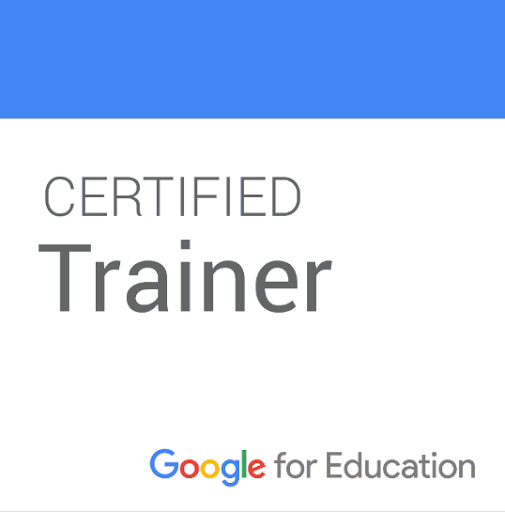 As a GCT, a school librarian adds the value of also being a tech coach, someone able to apply the practice of pedagogy to the integration of tech skills, not just to troubleshoot glitchy programs. This is a benefit to all of your patrons: teachers, students, administrators, and board of education members. As a GCT, a school librarian adds the value of also being a tech coach, someone able to apply the practice of pedagogy to the integration of tech skills, not just to troubleshoot glitchy programs. This is a benefit to all of your patrons: teachers, students, administrators, and board of education members.
GCTs receive early notification of the latest updates and releases in Google products. As a school librarian, I could tell my staff and students that something in Meet or Classroom is going to change or improve, before the teachers get too deep into a project or encounter frustration with a tool not working quite like they’d want it to.
My GCT certification allowed me to break out of the “Book Lady” role in a way no other professional development ever did. My upper administration finally began to see my roles beyond the physical walls of the library, and when COVID-19 hit, I became an indispensable resource not only to teachers, but to administrators, instructional aides, and administrative assistants as well.
As a GCT, I provide onsite, meaningful, and in-context professional development to the staff and administration. I’m available to help one-on-one, at lunch-n-learns, during co-teaching, at department meetings, and during in-services at no extra expense to the district. It’s a win-win. I am still sought after, and I’m more confident.
Q: What is a Google Certified Trainer (GCT)?
A: The official Google answer. A more extensive, realistic answer comes from So You Want to Become a Google Certified Trainer, an electronic manual by Daren White (shared with his permission).
Q: What is the cost?
A: The Google Certified Educator Level 1 exam is $10; the Google Certified Educator Level 2 exam is $25; and the Trainer Skills Assessment is $15. Once you become a GCT, however, you can use that certification to make additional money. You can register in the Google Education Directory and be found by others who will pay you for your expert training.
Q: How long does it take and how long does it last?
A: I started in late 2017 and have since renewed once. (Note, because of the video portion of the GCT process, at the time of this article, renewals for GCTs are currently waived because of COVID restrictions facing so many school employees.)
The Level 1 and Level 2 assessments each give you up to 180 minutes to take the assessment, and the certification lasts for three years.
There are non-mandatory Fundamentals Training for Level 1 and Advanced Training for Level 2, and Google says that each of them will take 15 hours. I recommend being prepared for twice that amount of time. (Note: Both of these training courses may be used for personal, professional development without moving to the next step of taking the assessment exam for actual certification.)
Certified Trainer assessment is different in that it’s a yearly update, and the assessment includes a video component. Like the Level 1 and 2 training courses, though, Google says it takes just over 20 hours to do the Google Certified Training Course, and I have always found it takes about twice that.
Once you certify in Level 1 and 2, complete the trainer course, and pass its assessment, the last steps are to create a three-minute video and submit your trainer application.
The yearly ongoing requirements to maintain your Certified Trainer status are:
- Conduct and report at least 12 training events per year.
- Share ideas and resources with a community of trainers.
- Resubmission of interest, including an annual product update assessment.
Q: What can someone gain from it?
A: In preparation for this article, I asked GCTs through our Google Group to respond to rate the importance of 14 parameters that benefit GCTs. I received 65 responses. The parameters that ranked highest:
- “Professional and personal growth; lifelong learning.”
- “Using tech tools creatively; helping others use tech tools creatively.”
- “Digital leader; get a more complete set of skills.”
- “Ongoing professional development.”
The two lowest-ranking items were “Badges” and “Earn extra income; prepare for a career change.”
Q: What is the difference between a Google Certified Educator and a Google Certified Trainer?
A: A Google Certified Educator has earned their certification at Level 1 and/or Level 2, for personal professional development. According to Google, Level 1 represents “mastery of Google tools in your classroom” and Level 2 “validate(s) your expertise and advanced technology integration skills.”
A Google Certified Trainer has completed additional coursework and assessments beyond certification in Levels 1 and 2. Certified Trainers coach others to use Google tools, to help educators transform their classrooms using Google tools.
Q: How many / what percentage of GCTs are librarians?
A: I asked, but the information is proprietary.

Supporting New Jersey’s Job Seekers
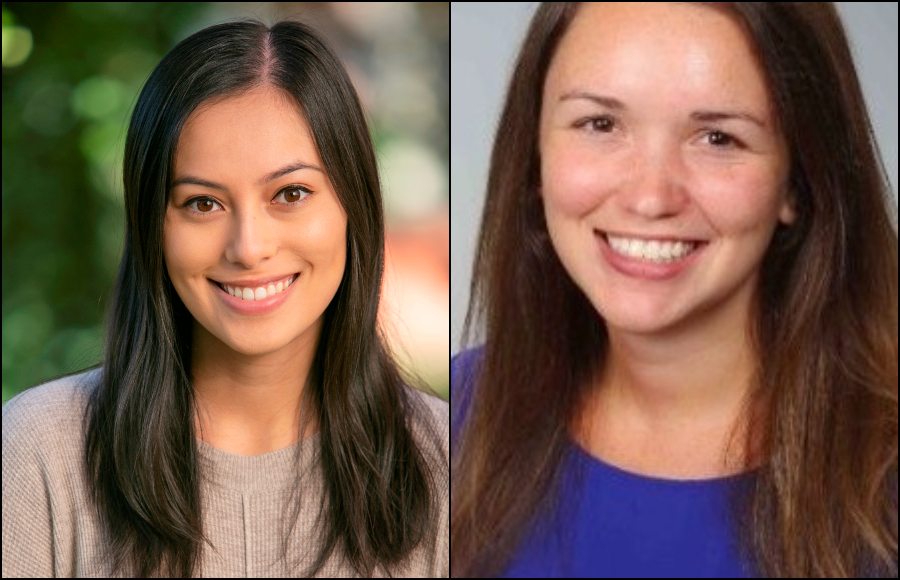 By Liana Volpe and Stephanie Holcomb By Liana Volpe and Stephanie Holcomb
John J. Heldrich Center for Workforce Development
(Emails: liana.volpe@ejb.rutgers.edu; stephanie.holcomb@ejb.rutgers.edu)
As the COVID-19 pandemic enters its second year, the sudden virtual adaptations libraries had to make have become more permanent fixtures in programming and service delivery in the new virtual-dominant normal. Libraries have made exemplary strides in developing their virtual presence, such as shifting programming to online platforms, expanding lines of communication to reach librarians and library staff, updating websites and digital catalogs, and more.
The John J. Heldrich Center for Workforce Development at Rutgers University has been involved in research on the role of libraries in the workforce development system for several years, conducting national and state-level research to better document and analyze current practices and areas for opportunity. Throughout the pandemic, Heldrich Center researchers have spoken to many library staff and reviewed all library websites in the state, and have identified several key practices for how libraries could better embed and promote virtual programming to job seekers in their communities.
Libraries have a longstanding reputation as trusted community entities entrenched in addressing patron and community needs. For this reason, libraries should consider the ways in which they can continue to address the ongoing employment crisis and obstacles faced by unemployed community members at this time. Since the pandemic began, unemployment numbers have remained high, and the share of long-term unemployed (those unemployed for six or more months) is continuing to rise to meet levels seen after the Great Recession.
 Following our last economic downturn of this scale, libraries played a pivotal role in helping job seekers with their search, including through resume and interview support, helping with online applications, and connecting them with public assistance or training opportunities. As libraries revisit their role in supporting those who are unemployed or underemployed as we approach another economic recovery, our research shows that there are several opportunities to meet a wider range of needs of community members by expanding or adopting the following practices. Following our last economic downturn of this scale, libraries played a pivotal role in helping job seekers with their search, including through resume and interview support, helping with online applications, and connecting them with public assistance or training opportunities. As libraries revisit their role in supporting those who are unemployed or underemployed as we approach another economic recovery, our research shows that there are several opportunities to meet a wider range of needs of community members by expanding or adopting the following practices.
Devote resources to providing holistic care and supporting the needs of the whole person.
Libraries can consider how they utilize existing efforts and resources to cultivate more targeted assistance to the job seeker population. Libraries that host virtual wellness and physical exercise classes could consider an expansion of services to offer classes such as “Yoga for Job Seekers” or “Meditation and Mindfulness for Job Seekers.” Research shows that job seekers benefit from interacting with similarly situated individuals to reduce isolation and reinforce the message that they are not alone.
Establish open avenues for virtual communication and connection.
Libraries' unique positioning as a trusted community entity makes patrons feel that they can always turn to their local library for help. Now more than ever, the physical library is no longer the only way patrons can come to the library for assistance. Libraries can use website chats, conference call lines, or video conferencing services to connect with patrons to understand and support their holistic needs. Librarians executing this service do not have to be licensed health professionals. This service is about offering support and compassion, not offering clinical help or diagnoses. For example, some libraries are offering check-in calls to patrons who would normally stop into the library or developing online community spaces for groups to socialize.
Reach customers where they are by using email and text campaigns to disseminate job search tips, advice, and support.
Technology can facilitate creating outreach campaigns that can be highly customized to address job search topics and delivered in a direct and accessible format for maximum engagement. Campaigns can be designed to tackle wellness (“We are here to support you”) or specific topics (“Tips on how to write an effective resume”).
Technologies to consider include:
- Email services such as Constant Contact (starting at $20/month, price based on number of contacts), MailChimp (free plan option for up to 2,000 contacts), and Sendinblue (free plan with unlimited contacts, up to 300 emails per day).
- Text-based services such as EZTexting (starting at $19/month) and SlickText (starting at $29/month).
Create a video library of short recordings on how to execute on job search basics.
By creating a library of short and digestible video content, librarians can assist patrons with the basics of job search in a more accessible format. Many people have limited bandwidth to take in new information at this time, so short multimedia content will more effectively resonate with users. The flexibility of this content creation also gives people the ability to access resources on their own time, as many juggle a variety of obligations. In addition, libraries can take advantage of expanded boundaries in a virtual environment by aggregating resources across the state.
Implement the “Flip the Classroom” model for running workshops.
When hosting events or workshops, consider implementing “Flip the Classroom,” a learning tactic which calls for participants to review materials before meeting, and then the event is used to discuss implementation of what was learned. This learning tactic has proven effective in moving people into action and execution mode and is easy to implement in a virtual setting. Learn more about “Flip the Classroom” in a webinar and informational handout.
Join the New Jersey Career Network Coaching Community of Practice and utilize additional resources to assist with job seeker services.
Pull additional tips on serving job seekers needs from the NJCN Coaching Community of Practice, which is designed to bring together service providers to share information, resources, and opportunities to learn.
Top photo: Liana Volpe (left) and Stephanie Holcomb.
|
|

How I Became the ‘Literacy Lady’
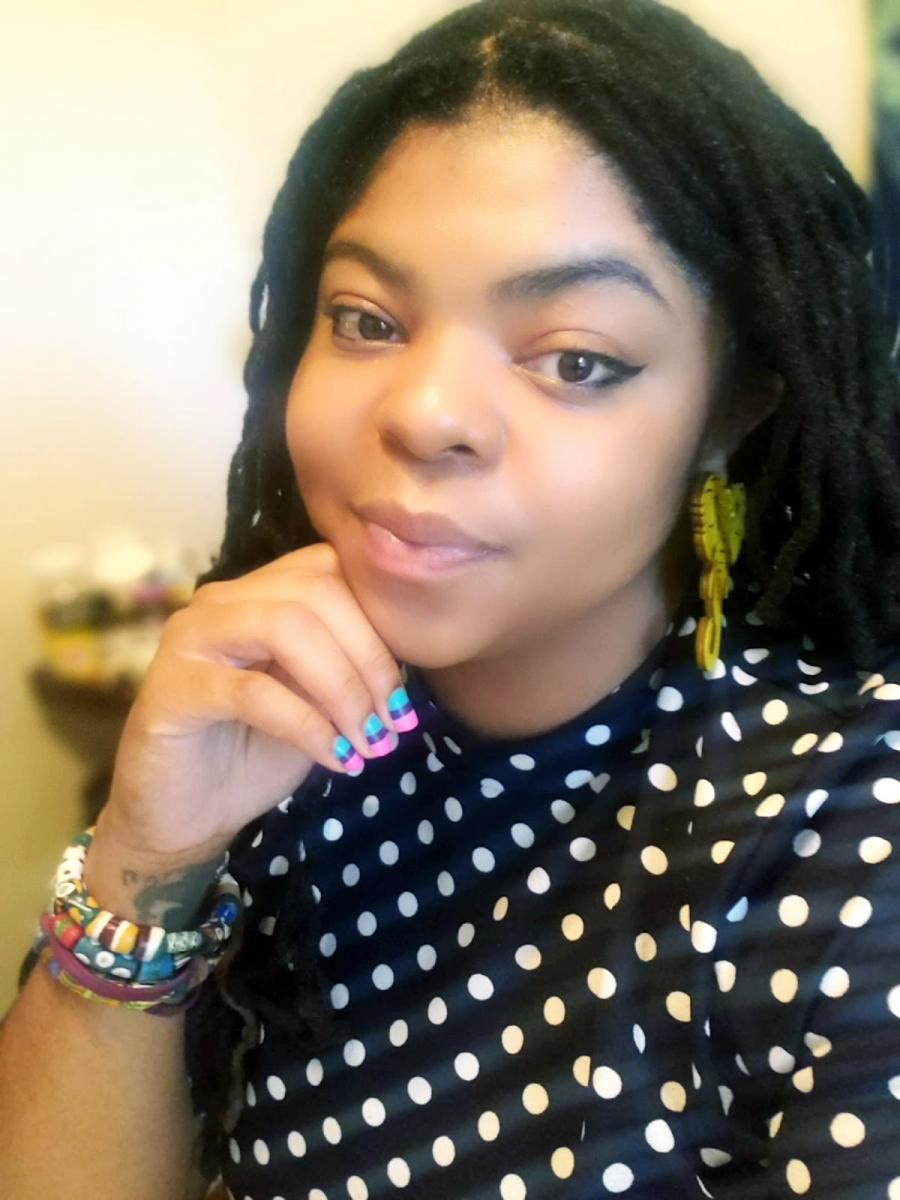 By Jade Mapp By Jade Mapp
Literacy Coordinator, Hoboken Public Library
(Email: jade.mapp@hoboken.bccls.org)
My current position at the Hoboken Library as the “Literacy Lady” (Literacy Coordinator) has blossomed into an amazing opportunity to work as an educator within my library community. I coordinate and lead adult academic programs such as career literacy workshops, test prep, and ESL classes. My collaborations with the Youth Services department include virtual family programs, emergent reader activities, and diverse storytimes.
In addition, I work with various departments and community partners to help bridge gaps between the needs of the community and the services we’re providing. Proudly, I also co-chair my library’s Diversity and Inclusion Committee.
As an undergraduate English major, I never intended on pursuing a career in library work, though I did always want to be surrounded by literature and teachable moments. I loved the opportunities that came with tutoring in English, and helping others develop a love for reading and writing.
After graduating, I was heavily involved with exploring professional spaces with unconventional teaching settings. I’ve gained a deep devotion for working with marginalized and underserved communities because I understand that people rely on literacy for survival. The library has always been a source of empowerment through the knowledge that it imparts, and community engagement; it provides the best work atmosphere for my combined passions.
Being a literacy coordinator allows me to be an advocate for the community through services, lessons, and activities. I am constantly enthusiastic about finding ways to connect the library to the community we serve, and better supporting our patrons with library resources. A sense of accountability in practicing equity for all, and being receptive to community challenges as they come, must be conveyed in this work.
The biggest challenge I’ve come across as a library worker has been getting over the assumption that we experience few to no community-based issues. That is definitely not the case. By having more libraries full of workers of different backgrounds, offering more channels for assistance, and having better partnerships with institutions, we are redefining that pillar we have always intended to be in helping generations shape a happier future.
My advice for folks getting into library work is “come as you are.” The magical thing about a library is that it will always teach you something, whether you anticipate it or not. (It is full of information, after all.) I also suggest that people branch out of their comfort zones to realize that resource sharing cannot be one-dimensional. We can never underestimate the impact we can have on our community when we welcome people into our libraries with open-mindedness.
I am totally happy with my role in the library right now, but would love for it to grow into a leadership position. However, in order for me to trust that transition, I want to believe in the growth of our libraries.
My ideal library looks harmonious, welcoming, and supportive. We’d have collaborations with museums for history education linked to our collections. We’d have social work professionals on staff to help families or individuals in need. We’d have constant language support for patrons who may struggle to obtain assistance when entering the library. We’d have a calendar dedicated to diverse celebrations and events. We’d have constant liaisons with local schools and Department of Education personnel.
Most importantly, we’d have consistent internal support to make sure our library staff are not only held accountable for providing equity, but are reminded that they’re cared for, safe and valued.
Top of Page | Table of Contents |
|

Let the Great World Spin ...
 By Cynthia M. Lambert By Cynthia M. Lambert
Law Librarian, New Jersey State Library
(Email: clambert@njstatelib.org)
Views presented in the article are my own and do not necessarily reflect the views of my employer.
We’ve passed the one-year mark for pandemic life. I’m still standing, I think. The only thing I know for sure about this past year, is the world kept spinning.
You see, for me, the pandemic was not my biggest problem in 2020, not by a long shot. In February of 2020 I found out my mom, who suffered with dementia, had breast cancer. Her decline was fast in some ways, agonizingly slow in others. In late January 2021, Mom died. The pandemic didn’t change this horrible situation, but for me, it made the entire situation much easier.
The pandemic meant that I would work from home for the last year of my mom’s life. This allowed me to spend so much more time with her — a true gift. She long ago was unable to handle phone calls, so in the “before times” when 45 hours a week were spent working or commuting, I could not see her enough.
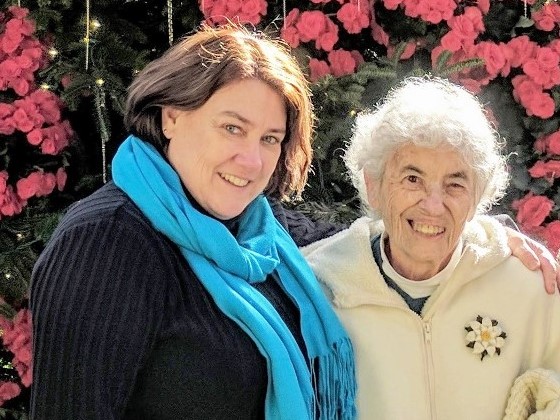 Every single minute mattered because the dementia stole Mom, long before the cancer ended her life. I was able to spend more time supporting my sister, Mom’s primary caregiver whose life was pandemic-like long before the pandemic. When you are the primary caregiver to someone with dementia, you don’t get out much, if at all. Every single minute mattered because the dementia stole Mom, long before the cancer ended her life. I was able to spend more time supporting my sister, Mom’s primary caregiver whose life was pandemic-like long before the pandemic. When you are the primary caregiver to someone with dementia, you don’t get out much, if at all.
I was able to cry during work hours without triggering horror from coworkers at such a strong display of emotions. I could scream into the void — not at all possible in a library setting of the “before.” I laughed hysterically because if not, I’d cry again. I could be alone, and when my mental capacity was overloaded and broken, I could take time off — one of the greatest benefits New Jersey library work offers. Most of these options were not available in the before times. The pandemic made me realize, that isn’t OK.
The pandemic is horrible. It has impacted every aspect of our lives. Still, the world keeps spinning. The human stuff continues: people die, break up, lose pets, fall in love, give birth, graduate, get married, get divorced, suffer loss, mental or physical illness, have loved ones suffering, laugh, cry, and scream. In short, we live.
As library workers, we are asked to do a LOT of emotional heavy lifting. “I need information on cancer” is a common reference question. For me, a law librarian, I get “Can I have the divorce kit?” (Full disclosure: There isn’t a standard divorce in New Jersey, so there is no kit. Legal Services of New Jersey has the best guide out there: Divorce in New Jersey: A self-help guide.) These interactions don’t end with our answer. We are asked to take in the story, the chapter in this person’s life that brought them to us. To do our jobs well, we must remain human.
In the before times, we were expected to check our humanity at the door and be “professional.” When we “return to normal” will we have to stop crying, laughing, or screaming into the void? I hope not, because that is all part of being a human being. It is normal.
Someone you work with today is facing one of life’s all-consuming trials. They are also creating a story-time, answering a reference question, doing outreach, cleaning the library bathroom because someone or something exploded, and working through their breaks. This is not a healthy way to live and/or work. Now is the time to advocate for your humanity.
First up: Take your breaks, all of them. Take your vacation time, all of it. If the pandemic teaches us anything, it is that life is fragile, don’t wait to live it. Plus, this is all part of your compensation package. Don’t cut your own pay!
 Next: Remember that your coworkers are humans. We need to say: “Go cry in the break room; I’ll cover you.” We need to be vulnerable, share our humanity, and ask for help — “I’ll be screaming into the void now. Please cover the reference desk for a few minutes.” Without the support and understanding of my coworkers and supervisors, I would have had to take a leave of absence. Their compassion and humanity touched me deeply. I am eternally grateful. Next: Remember that your coworkers are humans. We need to say: “Go cry in the break room; I’ll cover you.” We need to be vulnerable, share our humanity, and ask for help — “I’ll be screaming into the void now. Please cover the reference desk for a few minutes.” Without the support and understanding of my coworkers and supervisors, I would have had to take a leave of absence. Their compassion and humanity touched me deeply. I am eternally grateful.
Finally: No matter what happens next, the world will keep spinning and with it, new human issues will arise. Americans on average spend more waking hours at work than in any other activity — we must be allowed to be humans while working. Embrace your humanity and that of your coworkers. Advocate for it.
No one on their deathbed ever says “I didn’t spend enough time at the office.” Our humanity is our right — demand that it be acknowledged and accepted for yourself and your coworkers.
Center photo: Cynthia Lambert with her mother, Ethel Myles.
Top of Page | Table of Contents
|
|

Recap of Turning Tinted Pages: A Conversation and Celebration of Black Librarians & Library Workers
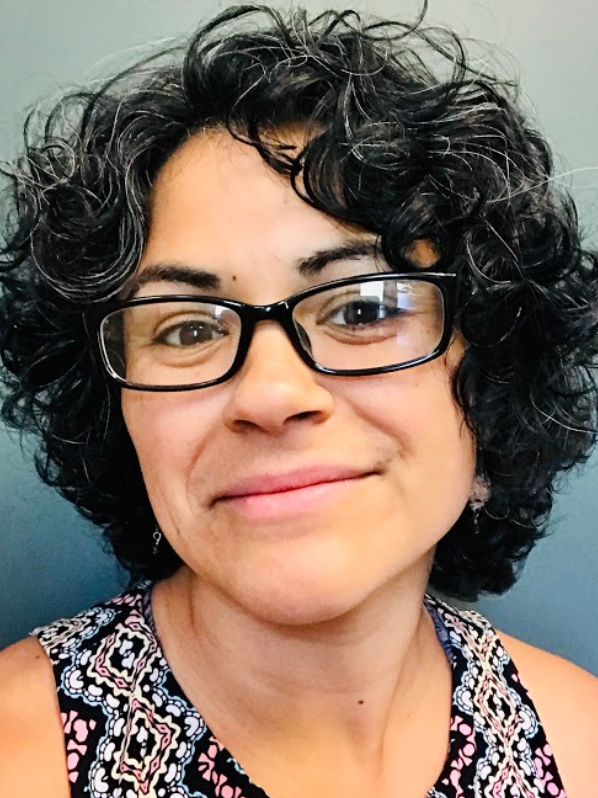 By Carina Gonzalez By Carina Gonzalez
Adult Services Librarian, Piscataway Public Library
(Email: librariancarina@gmail.com)
On February 5, 2021, five Black library workers generously shared their experiences in the program Turning Tinted Pages: A Conversation and Celebration of Black Librarians & Library Workers. This moderated panel discussion, jointly sponsored by the NJLA Library Workers of Color Roundtable, CUS/ACRL Anti-Racism Task Force, NJLA Professional Development Committee, and NJLA's Diversity & Outreach Section, focused on gaining a better understanding of the history and present state of Black librarianship.
The panelists were:
- Jade Mapp of the Hoboken Public Library.
- Ayoola White of the Jersey City Free Public Library.
- Christal Blue and Deadra Boardman of the Somerset County Library System.
- Lisa Richardson Hall of Lawrenceville High School.
Keisha Miller of the South Orange Public Library and Carina Gonzalez of the Piscataway Public Library moderated, with an introduction by one of the event planners, Theresa Agostinelli of LibraryLinkNJ and Brookdale Community College.
Miller opened Turning Tinted Pages with a brief history of Black libraries and library workers, honoring the ancestors who paved the way in libraries despite tremendous obstacles. She shared photographs throughout the history of Black library workers, activists both behind the circulation desk and out in the community. Few of us can look at our library's employment records and find people of color.
Next, the panelists discussed topics such as what led to their careers, the role of representation, obstacles they faced, and what advice they could provide for greater diversity, equity, and inclusion in hiring and collection development.
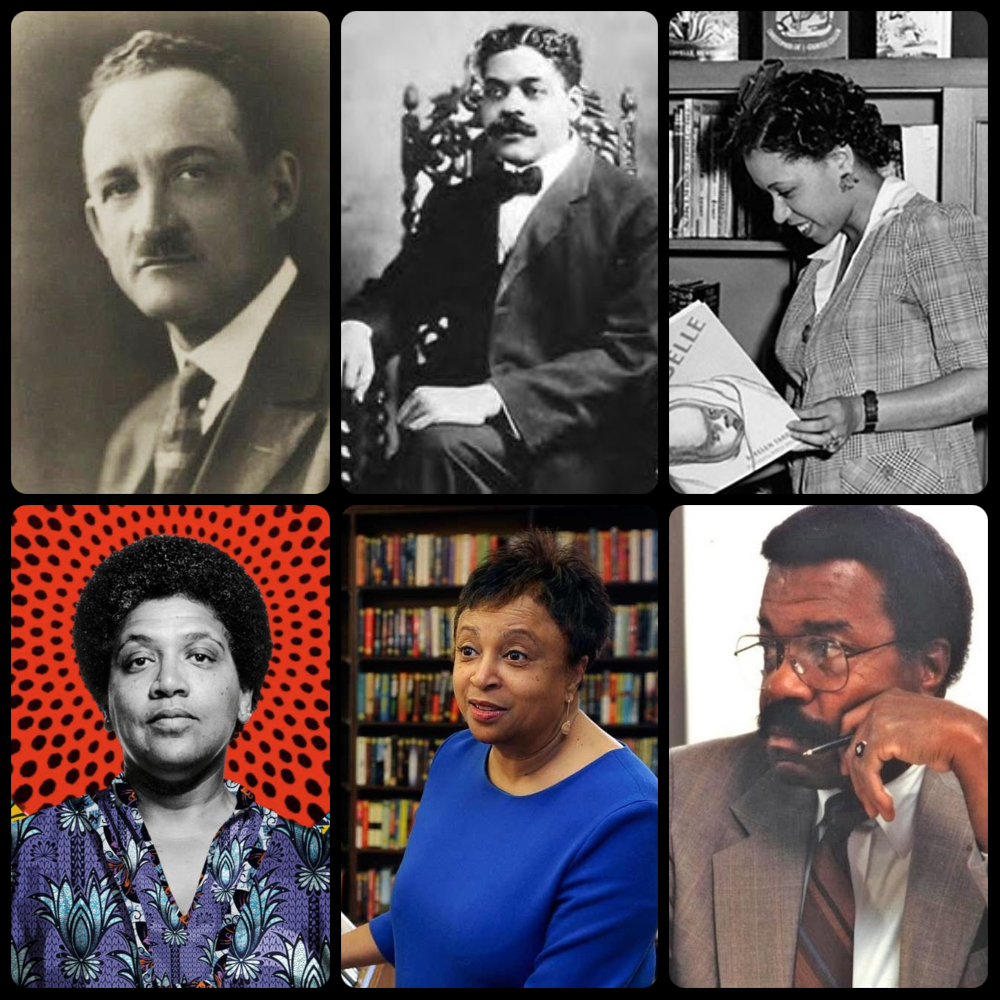 All five spoke on how representation — or the lack thereof — impacted their decisions to work in libraries. Some joined the library for pragmatic reasons, others for passion, but all landed in a profession they love and would like to make more welcoming for people of color. Many described careers frequented by microaggressions, oppressive dynamics, and the need to constantly navigate a dual consciousness through code-switching. All five spoke on how representation — or the lack thereof — impacted their decisions to work in libraries. Some joined the library for pragmatic reasons, others for passion, but all landed in a profession they love and would like to make more welcoming for people of color. Many described careers frequented by microaggressions, oppressive dynamics, and the need to constantly navigate a dual consciousness through code-switching.
When asked how allies can empower Black workers and people of color in libraries, the panelists provided authentic and unanimous advice:
- Notice the deficits, but do not make the people of color in your organizations the sole representatives.
- Allyship requires mutuality and more than just a hashtag of the month. Anti-racism demands vigilance and dedication 12 months of the year.
- Have the conversations that make us uncomfortable because it is the only route to authentic communication and cultural exchange.
In regards to collection development, the panel recommended purchasing outside of the major distributors. The 2019 Diversity Baseline Survey by Lee & Low Books reported that 76% of the overall industry, including publishers and authors, is white. In other words, many of the diverse offerings you could be adding to your shelves just aren't available in the ways libraries traditionally purchase.
This conversation was sometimes raw, often celebratory, and 100% enlightening. If you want to scratch the surface behind the thoughts of your Black library coworkers, make sure you see Turning Tinted Pages: A Conversation and Celebration of Black Librarians & Library Workers and the corresponding resources.
Center photo: Black pioneers in librarianship. (Top row, from left): Edward Christopher Williams, Arturo Schomburg, and Augusta Baker. (Bottom row, from left): Audre Lorde, Dr. Carla Hayden, and E.J. Josey.
Top of Page | Table of Contents |
|

Eric Schwarz, Newsletter Editor
President, NJLA Reference Section
Reference Librarian (pt), Clarence Dillon Public Library
Adult Services Librarian (pt), Union City Public Library
Generalist Librarian (pt), Englewood Public Library
Theresa Agostinelli
Programming & Outreach Specialist, LibraryLinkNJ
Reference & Instruction Librarian (pt), Middlesex County College
Adjunct Librarian, Brookdale Community College
Jen Fitzgerald
Youth Services Department Supervisor, Somerset County Library System of New Jersey, Manville Branch
Jennifer Larsen
User Experience/Adult Services Librarian, Sayreville Public Library
Selwa Shamy
Chair, NJLA Professional Development Committee
Assistant Director, Montclair Public Library
Please contact the Professional Development Newsletter Editorial Board (pdnewsletter@njlamembers.org) if you have suggestions or content to contribute.
Top of Page | Table of Contents
|
|
|
|

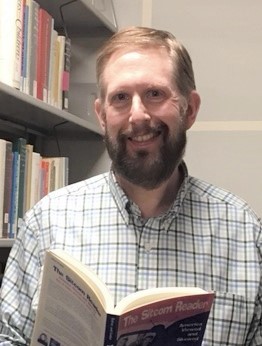 By Eric Schwarz
By Eric Schwarz

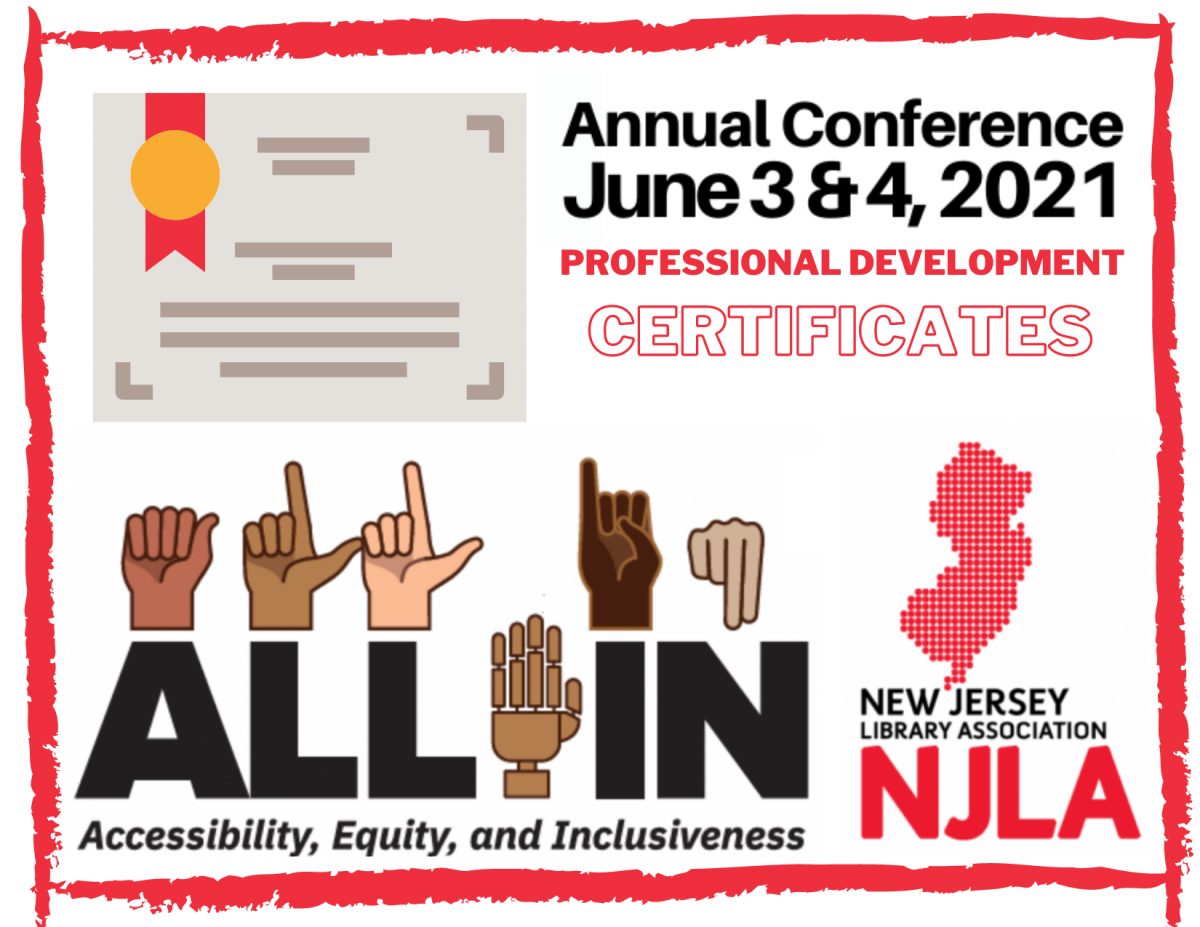
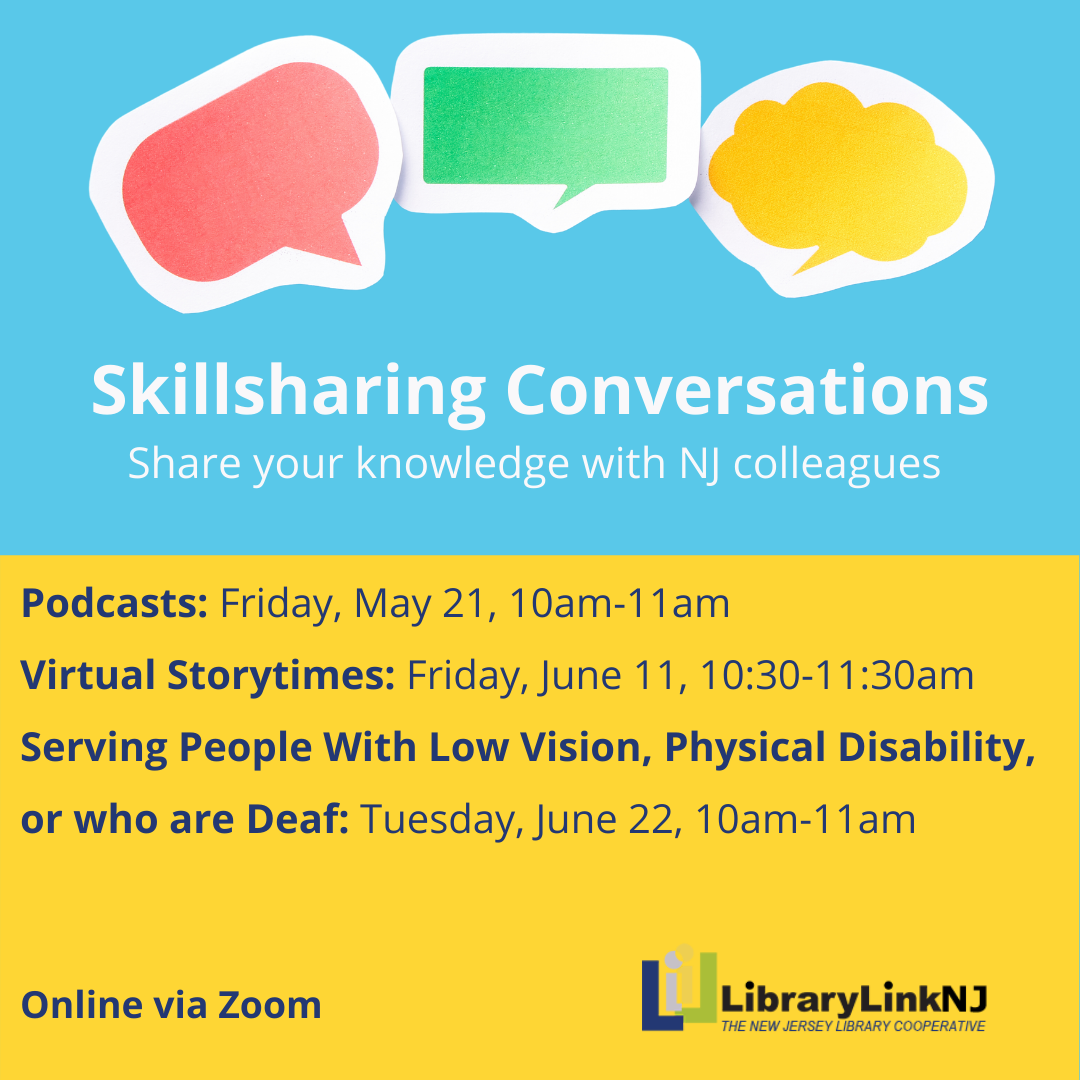 LibraryLinkNJ (LLNJ) Skillsharing Conversations are one-hour, virtual conversations on relevant library topics. Each conversation will follow an agenda and will be moderated by one of our talented colleagues, providing a great opportunity for the NJ Library community to learn and grow together. All LibraryLinkNJ members are welcome to attend. Upcoming conversations will discuss:
LibraryLinkNJ (LLNJ) Skillsharing Conversations are one-hour, virtual conversations on relevant library topics. Each conversation will follow an agenda and will be moderated by one of our talented colleagues, providing a great opportunity for the NJ Library community to learn and grow together. All LibraryLinkNJ members are welcome to attend. Upcoming conversations will discuss: From the New Jersey State Library (NJSL):
From the New Jersey State Library (NJSL):
 By Arlen Kimmelman, GCT, M.A., Ed.M., NBCT
By Arlen Kimmelman, GCT, M.A., Ed.M., NBCT As a GCT, a school librarian adds the value of also being a tech coach, someone able to apply the practice of pedagogy to the integration of tech skills, not just to troubleshoot glitchy programs. This is a benefit to all of your patrons: teachers, students, administrators, and board of education members.
As a GCT, a school librarian adds the value of also being a tech coach, someone able to apply the practice of pedagogy to the integration of tech skills, not just to troubleshoot glitchy programs. This is a benefit to all of your patrons: teachers, students, administrators, and board of education members.
 By Liana Volpe and Stephanie Holcomb
By Liana Volpe and Stephanie Holcomb Following our last economic downturn of this scale, libraries played a pivotal role in helping job seekers with their search, including through resume and interview support, helping with online applications, and connecting them with public assistance or training opportunities. As libraries revisit their role in supporting those who are unemployed or underemployed as we approach another economic recovery, our research shows that there are several opportunities to meet a wider range of needs of community members by expanding or adopting the following practices.
Following our last economic downturn of this scale, libraries played a pivotal role in helping job seekers with their search, including through resume and interview support, helping with online applications, and connecting them with public assistance or training opportunities. As libraries revisit their role in supporting those who are unemployed or underemployed as we approach another economic recovery, our research shows that there are several opportunities to meet a wider range of needs of community members by expanding or adopting the following practices.
 By Jade Mapp
By Jade Mapp
 By Cynthia M. Lambert
By Cynthia M. Lambert Every single minute mattered because the dementia stole Mom, long before the cancer ended her life. I was able to spend more time supporting my sister, Mom’s primary caregiver whose life was pandemic-like long before the pandemic. When you are the primary caregiver to someone with dementia, you don’t get out much, if at all.
Every single minute mattered because the dementia stole Mom, long before the cancer ended her life. I was able to spend more time supporting my sister, Mom’s primary caregiver whose life was pandemic-like long before the pandemic. When you are the primary caregiver to someone with dementia, you don’t get out much, if at all. Next: Remember that your coworkers are humans. We need to say: “Go cry in the break room; I’ll cover you.” We need to be vulnerable, share our humanity, and ask for help — “I’ll be screaming into the void now. Please cover the reference desk for a few minutes.” Without the support and understanding of my coworkers and supervisors, I would have had to take a leave of absence. Their compassion and humanity touched me deeply. I am eternally grateful.
Next: Remember that your coworkers are humans. We need to say: “Go cry in the break room; I’ll cover you.” We need to be vulnerable, share our humanity, and ask for help — “I’ll be screaming into the void now. Please cover the reference desk for a few minutes.” Without the support and understanding of my coworkers and supervisors, I would have had to take a leave of absence. Their compassion and humanity touched me deeply. I am eternally grateful.
 By Carina Gonzalez
By Carina Gonzalez All five spoke on how representation — or the lack thereof — impacted their decisions to work in libraries. Some joined the library for pragmatic reasons, others for passion, but all landed in a profession they love and would like to make more welcoming for people of color. Many described careers frequented by microaggressions, oppressive dynamics, and the need to constantly navigate a dual consciousness through code-switching.
All five spoke on how representation — or the lack thereof — impacted their decisions to work in libraries. Some joined the library for pragmatic reasons, others for passion, but all landed in a profession they love and would like to make more welcoming for people of color. Many described careers frequented by microaggressions, oppressive dynamics, and the need to constantly navigate a dual consciousness through code-switching.
